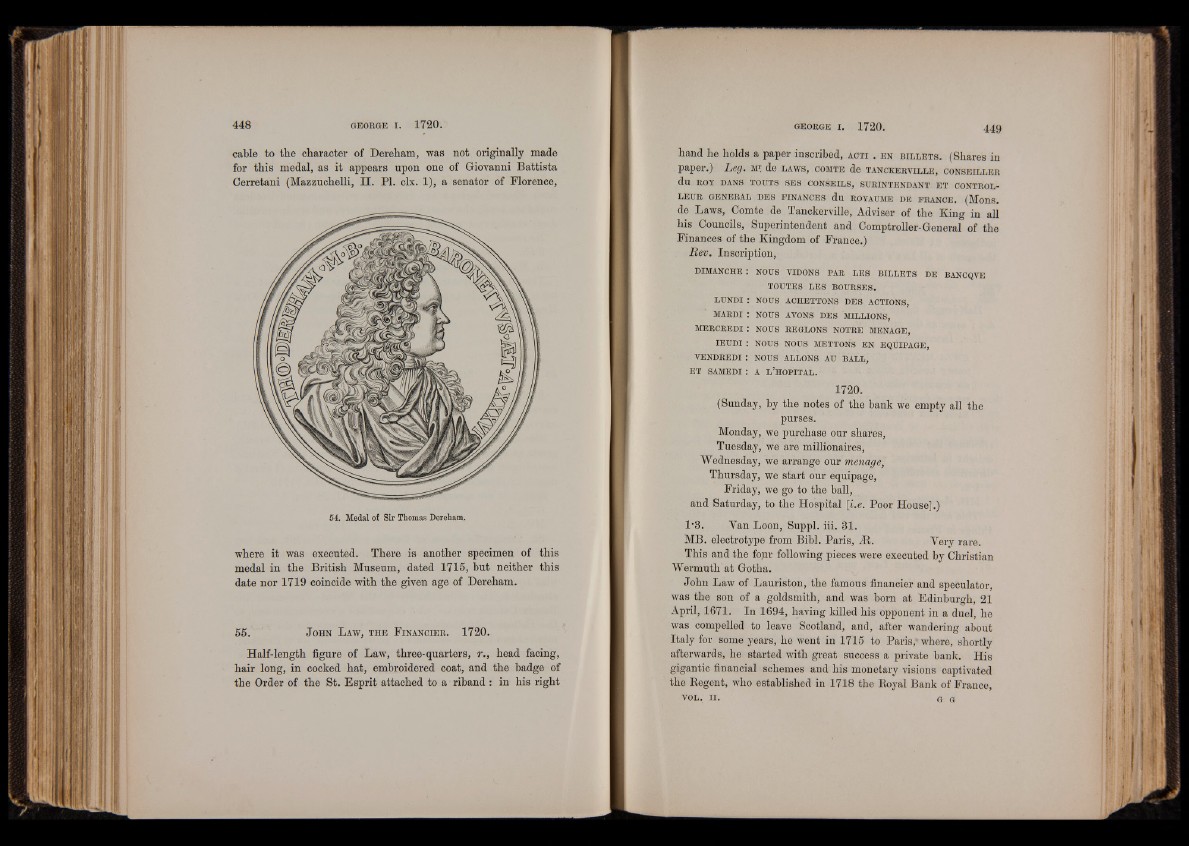
cable to the character of Dereham, was not originally made
for this medal, as it appears upon one of Giovanni Battista
Cerretani (Mazzuchelli, II. PI. clx. 1), a senator of Florence,
54. Medal of Sir Thomas Dereham.
where it was executed. There is another specimen of this
medal in the British Museum, dated 1715, but neither this
date nor 1719 coincide with the given age of Dereham.
J o h n L aw, t h e F in a n c ie r . 1720.
Half-length figure of Law, three-quarters, r., head facing,
hair long, in cocked hat, embroidered coat, and the badge of
the Order of the St. Esprit attached to a riband : in his right
hand he holds a paper inscribed, a c t i . e n b il l e t s . (Shares in
paper.) Leg. Mi de law s , comt e de ta n c k e r v il l e , c o n s e il l e r
du ROY DANS TOUTS SES CONSEILS, SURINTENDANT ET CONTROL-
LEUR GENERAL DES FINANCES du ROYAUME DE FRANCE. (MonS.
de Laws, Comte de Tanckerville, Adviser of the King in all
his Councils, Superintendent and Comptroller-General of the
Finances of the Kingdom of France.)
Rev. Inscription,
DIMANCHE : NOUS VIDONS PAR LES BILLETS DE BANCQVE
TOUTES LES BOURSES.
LUNDI : NOUS ACHETTONS DES ACTIONS,
MARDI : NOUS AVONS DES MILLIONS,
MERCREDI : NOUS REGLONS NOTRE MENAGE,
IEUDI : NOUS NOUS METTONS EN EQUIPAGE,
VENDREDI : NOUS ALLONS AU BALL,
ET SAMEDI : A L ’HOPITAL.
1720.
(Sunday, by the notes of the bank we empty all the
purses.
Monday, we purchase our shares,
Tuesday, we are millionaires,
Wednesday, we arrange our menage,
Thursday, we start our equipage,
Friday, we go to the ball,
and Saturday, to the Hospital [i.e. Poor House].)
1'8. Yan Loon, Suppl. iii. 31.
MB. electrotype from Bibl. Paris, JR. Very rare.
This and the fo,ur following pieces were executed by Christian
Wermuth at Gotha.
John Law of Lauriston, the famous financier and speculator,
was the son of a goldsmith, and was born at Edinburgh, 21
April, 1671. In 1694, having killed his opponent in a duel, he
was compelled to leave Scotland, and, after wandering about
Italy for some years, he went in 1715 to Paris,* where, shortly
afterwards, he started with great success a private bank. His
gigantic financial schemes and his monetary visions captivated
the Kegent, who established in 1718 the Royal Bank of France,
VOL. I I . Q G